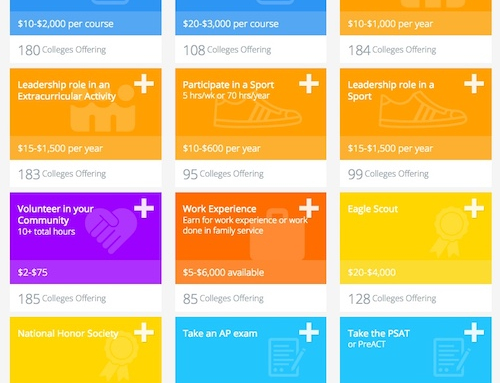External scholarships are a great source of money for college, but an institutional scholarship – a college scholarship given by the university itself – often offers substantial amounts of money over multiple years. When students position themselves as attractive candidates to colleges, they have a leg up on the competition for these big-money institutional scholarships.
To be pursued by colleges and universities – and to be eligible for institutional college scholarships – a student has to take the right type of classes during high school. Yet parents of an entering high school freshman can find it next to impossible to navigate the school’s curriculum and determine which classes are the best fit for their college-bound student. That’s why it’s important to understand what colleges look for when it comes to college admission and college scholarships, and to ask the right questions of the high school counselor before the student enrolls in classes.
Rigor and the Institutional College Scholarship
Colleges want to admit students (and offer them college scholarships) who have been challenged academically and who have a track record of success. The term for these challenging academic classes is “rigor.” Examples of rigorous classes are Honors classes, Advanced Placement classes, and International Baccalaureate classes. The hallmark of rigorous classes is that the content of the course is advanced and that that the intensity of the content surpasses regular classes.
Research demonstrates that students who take rigorous classes are more likely to complete high school, have greater access to college, and are most likely to complete their college degrees. Of course, it’s hard to know if the rigorous courses cause students to succeed, or if the students already more likely to succeed are the ones who select rigorous courses. Either way, rigor can help propel a student toward success – and toward an institutional college scholarship.
Selecting High School Classes
Today’s high schools may be magnet schools that concentrate on one discipline (such as performing arts or mathematics). They might have academies within a traditional school setting (such as a culinary academy or a green energy technology academy). They could have Career Technical Education (CTE) programs that prepare students for the workforce. They may offer Advanced Placement courses or be an International Baccalaureate school. Or, they may only offer a general high school curriculum.
When selecting freshmen courses, it’s important to understand which courses lead to a college track and which do not. Public schools have scarce resources, and often decide early on which students are bound for college and which are not. Those who are selected receive access to rigorous courses, while those who are not are assigned less challenging coursework or tracked onto a career path. That practice of tracking disproportionately and negatively impacts students of color (though The Atlantic makes the case that tracking can help those same students).
That’s why it’s important to research a school’s course offerings and ensure that the student has access to rigorous coursework. The academy or CTE program that sounded great during Freshman Orientation Night might actually be designed for students who aren’t college bound. Establishing and maintaining a relationship with a student’s high school counselor – and letting them know that the student is destined for college – can create a partnership that ensures access.
A Few Caveats
In theory, taking a boatload of rigorous coursework in high school will lead to college scholarships. In practice, it’s equally important that students have balance in their lives. Concentrating only on classes at the expense of community service, extracurricular activities, and sports will not lead to college admission and college scholarships. It will lead to burned-out, unhappy students.
Similarly, having a slew of Honors and AP classes on a student’s transcript isn’t helpful if the student isn’t able to get good grades. And don’t count on the grade “bump” that comes with weighted grades. Some schools only use unweighted GPAs and others count only a limited number of weighted grades. So it’s important that students take the most rigorous coursework in which they can do well. If a student’s AP grades are causing their GPA to take a nosedive, it’s time to switch back to regular courses.
Finally, if a school doesn’t offer rigorous courses, don’t worry. Colleges know each high school’s profile, and evaluate rigor according to what’s available to the student at their school. A student can still be eligible for an institution’s college scholarship if they get great grades and stand out from the crowd in other ways.
Want more info and tips about college scholarships? Subscribe to the Scholarship Money Online newsletter.





Leave A Comment